Occupy the Education System: Students, Teachers and Parents Find New Spirit and Challenge the Attack on Public Schools
Mouse over and click the photographs in this story and you can listen to audio recordings as well.
“I work hard, but my grades don't matter. But I have a voice and I will be heard!”
Jordan
is 13, and she's speaking to a crowd of mostly adults, sitting on the
granite steps of the New York City Department of Education at Tweed
Hall. Or rather, she is speaking through them, as her words echo through
the people's mic used at Occupy Wall Street just few blocks south from
where she's speaking.
Tonight
the steps of the DOE themselves have been occupied and are packed with
teachers, students, parents, and supporters holding a general assembly
on the state of public education in New York.
Jordan
was far from the only student to speak. A young girl holding up one end
of a sign that read “Nothing about us, without us, is for us!” declared
“I am angry! I am PISSED! And I want JUSTICE!” in ringing tones, and
Devan, a poet, read a poem over the people's mic.
Perhaps
the most remarkable thing about this event was the way in which it
brought together those who might be considered adversaries in a
conversation about the things they feel are hurting schools.
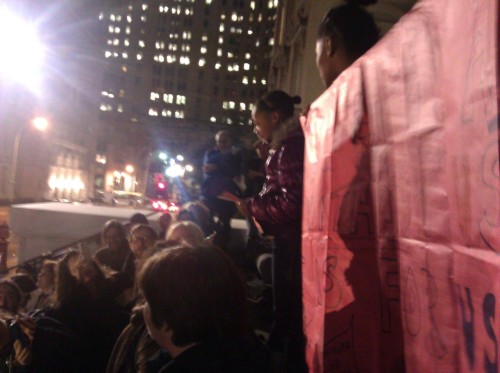
Students
spoke about the pressure of high-stakes testing, but also of their
teachers' hard work and low pay. Teachers worried that their students
were not learning because they were cramming for tests, and parents
called for teachers to be supported, not threatened.
Rosie
Frascella, a teacher and one of the organizers of this general
assembly, told me before the event happened that invitations to speak
had been issued to Mayor Mike Bloomberg and Schools Chancellor Dennis
Walcott.
“If Chancellor
Walcott and Bloomberg choose to show up, they will have the same
opportunity to speak as all of us, and to show them what a democratic
process looks like, because obviously they don't know,” she said.
The Fight in New York
The
first Occupy the Department of Education (Occupy the DOE) action took
place on October 25 at the Panel for Educational Policy's regular public
meeting where teachers, parents and students are invited to speak to
the city's education policymakers—but on the policymakers' terms.
“The
PEP represents the struggle of OWS in many ways. The PEP is essentially
mayoral control, the mayor appoints eight out of 13 panelists, so
whatever Bloomberg decides, he makes sure that his panelists vote in
alliance with his beliefs. It's very clear who the 1 percent is in
education: Bloomberg and Chancellor Walcott. The rest of us feel like
the 99 percent: teachers, students, and parents,” Frascella said.
Brian
Jones, a teacher at Brooklyn's PS 261, told me there was intense
frustration with the PEP among parents and teachers who had gone to many
meetings and testified through the approved channels, only to have
their voices ignored. “When they tried to close the 19 schools people
testified until four in the morning, hundreds testified, and the PEP of
course votes with the mayor,” he said. “We’re going through these
motions of democracy even though what stands behind it is a
dictatorship.”
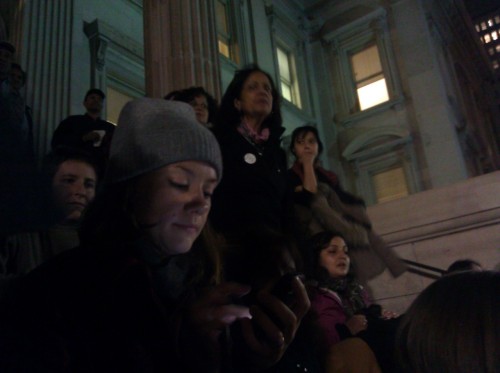
The
discussion that night was supposed to have been on new standards to be
implemented in the schools. “We should’ve had the discussion before the
implementation of such standards,” Jones said. “These standards were
funded by Bill Gates. The guy who wrote them is not even a teacher. it’s
like having a Surgeon General who never practiced medicine.”
Frascella
said, “We're thinking of new ways that we can allow parents and
students and teachers to have a voice in the decisions that are
affecting our lives, our working conditions, addressing and combating
this mayoral control. Mayoral control is really killing our city.”
“We don't have mayoral control in white suburbia, you only see policies like these in urban settings,” Frascella said.
It's not just the handing over of education department dollars to big corporations that led to the education actions, though. Standardized, high-stakes testing at the expense of real teaching time is also a major complaint. Jones told me that plans are now underway for high-stakes testing in arts and music. “There's urgency around making sure that every kid takes a music test but not that every kid has a music teacher,” he said. “The city has laid off 700 school aides. Meanwhile we have tens of millions of dollars wasted on technology consultants, and the DOE is hiring more data specialists, data consultants at very high salaries.”

Jones pointed out that charter schools are pushed by people who have an agenda, like Eva Moskowitz, a former city councilwoman and failed candidate for Manhattan borough president who now runs a multi-million-dollar charter school network. Moskowitz has her sights set on Brooklyn now. “This new charter school that Moskowitz is trying to build is backed by Goldman Sachs,” Jones noted. “You don’t have to work very hard to make the connections.”
“I think there’s certainly a critical mass of consciousness--a critical mass of people who through their direct experience with so-called education reform have come to figure out that this is a wolf in sheep’s clothing,” Jones said.
Occupy the DOE
The Occupy the DOE movement sprang out of teachers' involvement with the encampment in Liberty Plaza. Frascella explained, “We were doing these grade-ins at OWS, where teachers would come together and just grade at Wall Street. And while we were grading we were thinking about ways we could bring the Occupy movement to education.”
The group held a meeting at one of their grade-ins and decided to take their movement to the PEP, and gathered supporters to join them.
And so on October 25 over 200 parents, teachers and students headed for the PEP meeting, unsure of what would happen, but determined to make their voices heard.
As the panel began, the cry of “mic check!” familiar to anyone who's attended an Occupy Wall Street event rang out. You can see what happened there in the video below:
Eventually, the panel, including Chancellor Walcott, left the room, while parents and teachers and students (including 8-year-old Adriana, who told the meeting about her crowded class of 28 students) continued to hold their teach-in on the state of New York's schools.
“The first speaker was prepared to be escorted out,” Frascella told me. “We were prepared to cooperate and to leave but to have enough people to keep the people's mic going. It was kind of the best-case scenario that the panel decided to leave and go upstairs and hold their meeting upstairs.”
“I was almost in tears,” Jones said, explaining that he was seated at the end of a row in the back when the first speaker stood up. “There were cops lining the hallways. another sure sign of a strong democracy. There was a plainclothesman behind us and I’m sitting right on the aisle, and I'm thinking, is he gonna grab me? Well, why me? Sure enough, the police were baffled, they had no idea what to do.”
As Occupy Wall Street has grown and spread, working groups within the movement have explored ways to use its direct action tactics in different places to different ends. This was one of the first times the People's Mic itself was used as a tactic for occupying a space—which was later done to great effect at a speech by Wisconsin Governor Scott Walker as well.
“It was an amazing nonviolent form of civil disobedience,” Jones said. “[The people's mic] was invented for having a meeting, because [city officials] had prohibited them from having a sound system. They are the ones who prevented people from being amplified and then we used it to amplify ourselves in a different form and a different way.”
“[Chancellor Walcott] tried to spin it like we were taking away the voices of the parents. But we brought out more parents than he did,” Frascella noted.
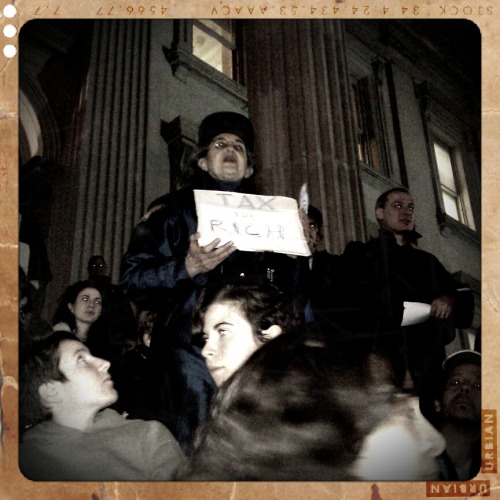
Building a National Movement
New York is far from the only state with a fight on its hands over education. Lisa Morrow (a pseudonym) is a Texas schoolteacher who told me, “The school districts are hurting for money big-time.”
To avoid teacher layoffs in her district, Morrow said, they're packing more and more students to a classroom. “Pre-K is up to 26 now that they can have in a classroom, it went up from 22. It's a different ratio for different grade levels. It's 30-something for high school, it's approaching 30 at the elementary level, which is ridiculous. It's ridiculous to be expected to teach that many little people.”
In addition, in her district, when teachers are absent, instead of hiring substitutes, they simply split up the kids and send them to other classrooms. “One day last week teachers had 12 extra people,” she said. “Almost 40 little people in your room, you don't have enough places to put them, you don't have enough material because you didn't know you were going to have that many people.”
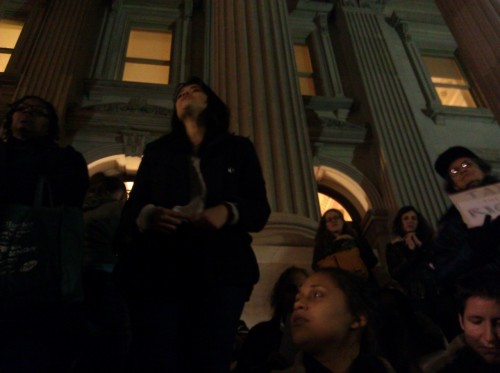
The problem with schools, in other words, is a nationwide issue requiring nationwide solutions as well as local action. But, Jones said, there seems to be little indication of real solutions coming from the top. “Barack Obama campaigned on the idea that he was going to challenge No Child Left Behind, that there was going to be a reversal of this whole top-down high stakes testing policy. Instead of a reversal of the Bush-era approach, we’ve gotten a ramping up of that.”
He argued, “The high-stakes test eliminates the connection between life and learning. It’s this remote, very artificial exercise that is given so much importance. Not only do the children’s careers depend on it but now the adults depend on it too.”
Jordan, the 13-year-old speaking at the Occupy the DOE General Assembly, agreed with him. “A test is a one-shot deal, if I forget something I could do bad.”
Teachers' unions have faced blame in New York and elsewhere for the problems with education, but Morrow's school district (and much of Texas) is not unionized and still faces the same crunch. “Teachers really have no power and no voice, they need their jobs and so all kinds of illegal things happen, people find all kinds of creative ways to get around the law, to violate students' rights, violate teachers' rights, violate parents' rights.”
“We’re moving toward a system the same way they did for Wall Street, they want the deregulation of education. They want to get rid of pesky union contracts and let the free market rip. It’s not going to be shocking that we see all kinds of scandals blossom,” Jones said.
But teachers have been at the heart of the resistance that's sparked in this country this year, from Wisconsin to Wall Street. Jones noted that despite what wound up being a loss in Wisconsin, teachers are very proud of the leading role that Wisconsin's educators played in fighting back against union-busting.
“Over the summer I went to at least two different meetings that were meetings of teachers from around the country trying to make these local struggles into a national struggle, trying to connect the dots from these different localities. It’s part of the aftermath of Wisconsin, but it’s also it is a national attack.”
School reformers like Michelle Rhee, who recently charged a university $35,000 for a speech, have claimed success for charter schools—Rhee wants to raise $1 billion to fight teachers' unions. But as Jones noted, scandals have been erupting that disprove some of the claims of success—and the teachers I spoke with feel the system is working just fine for education's 1 percent.
“What would they do if our students were 100-percent college bound? They don't have the financial aid and the resources to fund those kids to go to school,” Frascella said. “What would happen? You'd have more educated people with no jobs. They want people to work in the service industry. Until we create more high-paying, respectable jobs, where are the students going to go, even if they do get a college education?”
Morrow said that some people in her part of the country think the ultimate goal for the Right is the end of public schools entirely. “They want to privatize education so that the school districts will go out of business. Public school is really for poor people, moderate-income people, and everyone else can go to private school and they don't care. It's shown just how little they really care about the education system.”
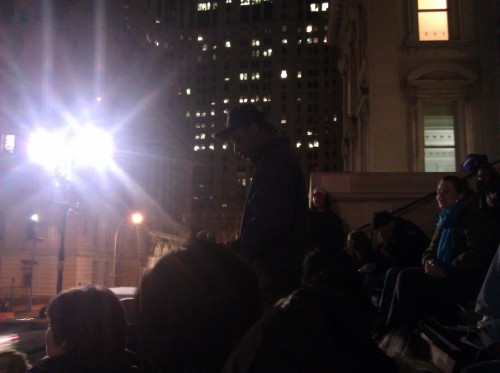
So what can be done? Can Occupy the DOE become a movement that spreads, like its parent movement, around the country and changes the way education conversations happen?
Jones pointed out that the movement's successes thus far make it seem like a time to dream big. “If we can hold Zuccotti Park, what else can we hold? What else should we hold? If we can take over a PEP meeting, what else can we take over? What else should we take over?”
“The students are really excited about Occupy Wall Street and are interested in it,” Frascella agreed.
But the education reform crowd is big and well-funded, and won't give up easily. Jones noted, “They don’t have to teach all day, they are working overtime to make sure that that never ever happens again, and we’re busy trying to figure out how to make sure it always happens.”
Still, the New York crowd was elated on Monday night at the Department of Education, the students thrilling to the feeling of speaking to a crowd and having their words repeated back to them with the same gravitas as their teachers and parents. Plans for splitting Occupy the DOE into working groups to plan strategies and more actions going forward were discussed at the general assembly, and on Sunday, Nov. 13, the group will be meeting at 60 Wall Street at noon to plan those working groups.
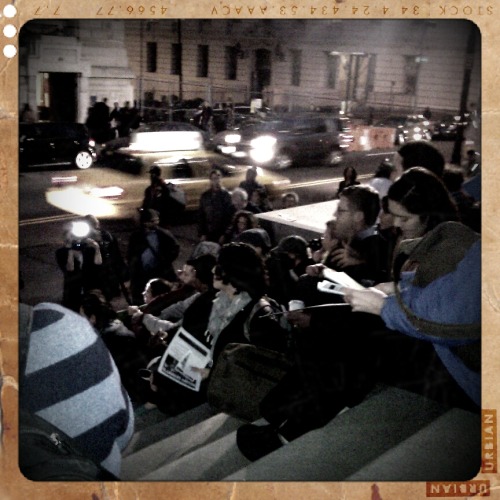
Sarah Jaffe is an associate editor at AlterNet, a rabblerouser and frequent Twitterer. You can follow her at @seasonothebitch.

No comments:
Post a Comment